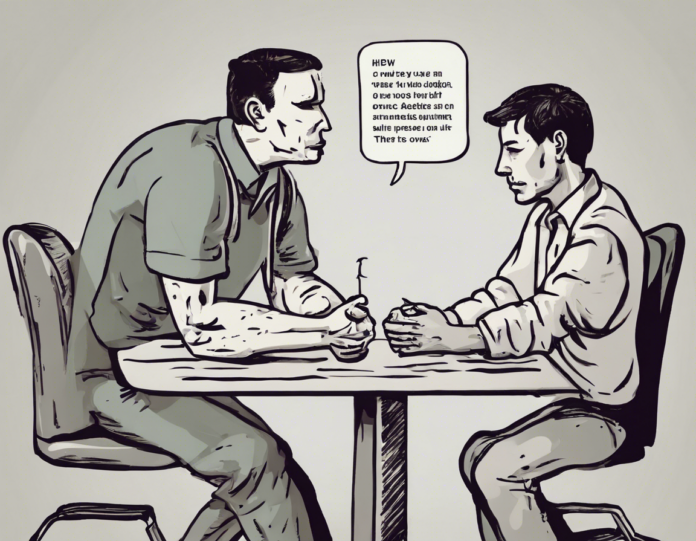Introduction
Pornography addiction is a prevalent issue that affects millions of individuals worldwide. It can have devastating effects on relationships, self-esteem, and overall mental health. If someone you love is struggling with porn addiction, it can be challenging to know how to best support them through their recovery journey. In this comprehensive guide, we will discuss strategies and tips to help you support a loved one struggling with porn addiction.
Understanding Porn Addiction
Porn addiction, also known as compulsive sexual behavior disorder, is a type of behavioral addiction characterized by an excessive, compulsive use of pornography. Like other forms of addiction, porn addiction can lead to negative consequences in various aspects of an individual’s life. It can also impact their relationships, work, and overall well-being.
Supporting Your Loved One
-
Open and Honest Communication: Encourage open and honest communication with your loved one about their porn addiction. Let them know that you are there to support them without judgment.
-
Educate Yourself: Take the time to educate yourself about porn addiction. Understanding the underlying causes and effects of porn addiction can help you better support your loved one.
-
Encourage Professional Help: Encourage your loved one to seek professional help from therapists or support groups specialized in treating porn addiction.
-
Establish Boundaries: It is essential to establish healthy boundaries with your loved one. Let them know what behaviors are acceptable and unacceptable in your relationship.
-
Be Patient and Supportive: Recovery from porn addiction is a journey that takes time and effort. Be patient with your loved one and offer your unconditional support throughout their recovery process.
Self-Care for Caregivers
Taking care of a loved one struggling with porn addiction can be emotionally draining. It is crucial to prioritize your own well-being as you support your loved one through their recovery journey. Here are some self-care tips for caregivers:
-
Set Boundaries: Setting boundaries is crucial to prevent caregiver burnout. Make sure to prioritize your own needs and well-being.
-
Seek Support: Reach out to friends, family members, or support groups for caregivers to share your experiences and receive support.
-
Practice Self-Care: Make self-care a priority by engaging in activities that bring you joy and relaxation. This can include exercise, meditation, hobbies, or spending time in nature.
-
Take Breaks: It is essential to take breaks from caregiving to recharge and rejuvenate. Allow yourself time off to rest and focus on your own well-being.
-
Consider Therapy: If you find yourself struggling to cope with the challenges of supporting a loved one with porn addiction, consider seeking therapy for yourself. A therapist can provide you with tools to manage stress and navigate your emotions effectively.
Frequently Asked Questions (FAQs)
1. What are the signs of porn addiction?
Signs of porn addiction may include spending excessive amounts of time watching pornography, neglecting responsibilities and relationships, experiencing cravings or withdrawal symptoms when not watching porn, and continued use despite negative consequences.
2. How can I talk to my loved one about their porn addiction?
Approach the conversation with empathy and understanding. Express your concerns without judgment and offer your support in their recovery journey.
3. Is porn addiction treatable?
Yes, porn addiction is treatable with the help of therapy, support groups, and other resources. Recovery is possible with the right support and dedication.
4. How can I support my loved one if they refuse help for their porn addiction?
Respect their decision, but continue to express your concerns and offer your support. Encourage them to seek help when they are ready, and continue to educate yourself about porn addiction in the meantime.
5. How can I rebuild trust with my loved one after their porn addiction?
Rebuilding trust takes time and patience. Open communication, setting boundaries, and seeking couples therapy can help facilitate the healing process and rebuild trust in the relationship.
6. How can I help my loved one prevent relapse after recovery from porn addiction?
Support your loved one in their aftercare plan, encourage healthy habits and coping mechanisms, and continue to be a source of support and accountability in their recovery journey.
Conclusion
Supporting a loved one struggling with porn addiction requires patience, understanding, and compassion. By educating yourself about porn addiction, fostering open communication, and prioritizing self-care, you can offer meaningful support to your loved one as they navigate their recovery journey. Remember that recovery is a process that takes time, and your unwavering support can make a significant difference in their healing. Stay informed, stay supportive, and remember to take care of yourself in the process.









